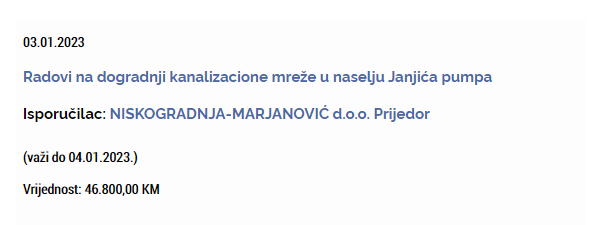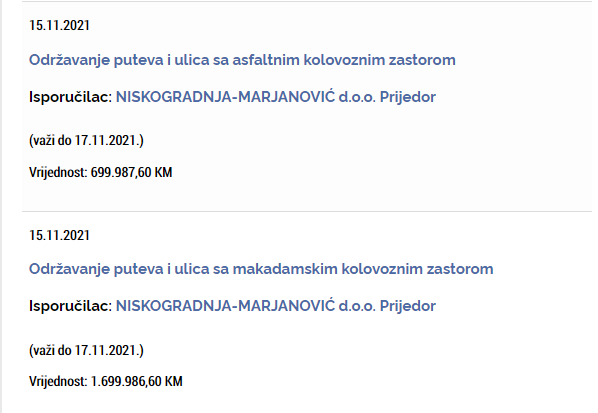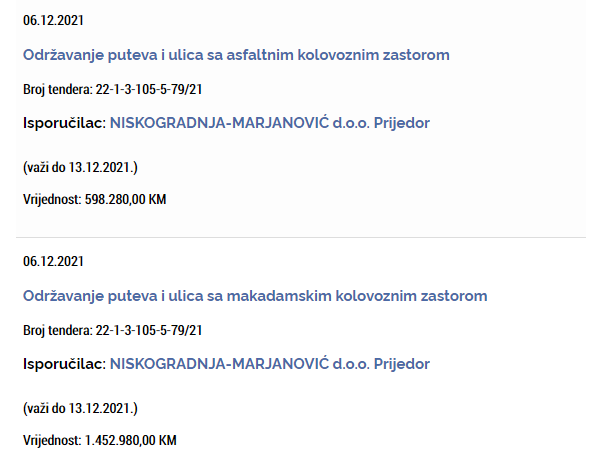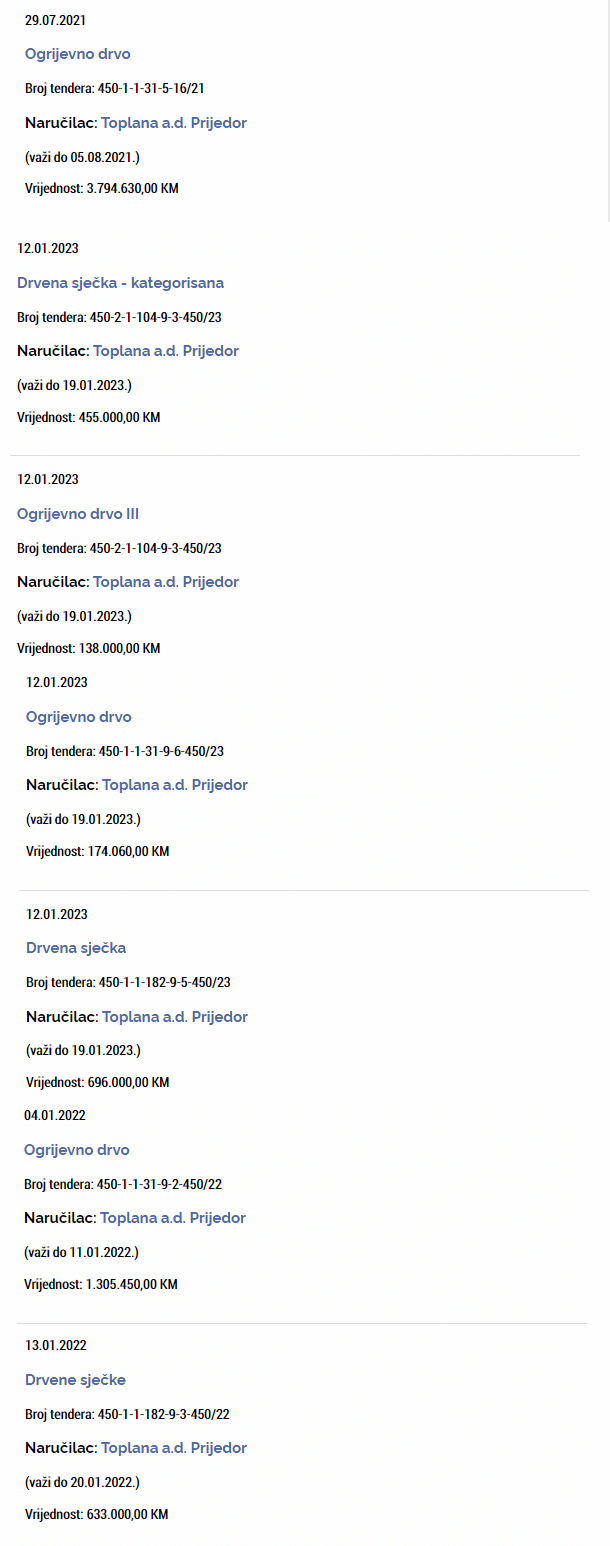In the last ten or so years, the company “Niskogradnja – Marjanović” has been an absolute monopoly in public procurement in Prijedor. The flourishing of this company, coincidentally or not, aligns with the appointment of Marko Pavić as the mayor of Prijedor. However, even after Pavić’s departure, the Marjanović family continues to receive lucrative contracts from the city and municipal enterprises, working on everything from small-scale projects such as the construction and maintenance of city beaches worth a few thousand marks to large-scale procurement of fuel for the city’s heating plant worth several million convertible marks.
Just in the past year and a half, the turnover of Marjanović’s contracts with city institutions and enterprises exceeds 10 million marks, with the majority of it being awarded for road maintenance, sewage network expansion, and the city’s heating plant.
PHOTO: CONTRACTS




In order to cater to the privileged, from the documentation we have in our possession, it is clear that the City of Prijedor engaged in “splitting procurement,” which is not in line with the Law on Public Procurement. As a result, they awarded both Marjanović and other companies multiple direct agreements for the same project, allowing expenditure from the city’s treasury without a tendering procedure. Besides “Niskogradnja-Marjanović”, these contracts were also awarded to “Brakom” d.o.o. Prijedor and “Elmating” d.o.o. Prijedor.

Furthermore, a particularly interesting case is when the Prijedor fish farm “Saničani” (which is in bankruptcy) awarded a contract for clearing the surrounding vegetation to the city’s heating plant. Shortly after, the heating plant “passed on” the job first to the company VB Proges (which did not have the necessary equipment and abandoned the project), and then to Niskogradnja-Marjanović, who began the clearing work around the fish farm. According to unofficial information obtained by Infoveza, the contract was awarded to Marjanović without a tender. However, Biljana Knežević, a councilwoman in the local parliament, claims that it quickly became apparent that there was firewood and technical wood (oak) among the cleared vegetation.
 “Most of the firewood that is used for biomass was taken away, and I assume it was taken to the heating plant, given that the contractor came there based on the contract signed with the heating plant. However, the bankruptcy administrator requested the cancellation of the mentioned project, whether due to negligence, inactivity, or failure to fulfil contractual obligations, I am not certain”, says Knežević.
“Most of the firewood that is used for biomass was taken away, and I assume it was taken to the heating plant, given that the contractor came there based on the contract signed with the heating plant. However, the bankruptcy administrator requested the cancellation of the mentioned project, whether due to negligence, inactivity, or failure to fulfil contractual obligations, I am not certain”, says Knežević.
Nevertheless, at present, no one can confidently state to whom the Marjanović family sold the logs. Our source in Prijedor emphasizes that a tender is currently being announced for the entire project that was completed last year and that Niskogradnja-Marjanović is expected to win the contract. It remains to be seen whether the Marjanović family will be awarded a project that has already been completed.
Knežević also claims that over the years, the Marjanović family, by winning contracts, has acquired the necessary conditions and equipment to legally obtain tenders due to the lack of competition.
“For many years, it happened that the contracts awarded by the city administration were consistently given to the Marjanović company, which resulted in the elimination of smaller economic entities engaged in similar activities. This primarily includes road embankment, gravel transportation, and various repairs. I’m not saying that Marjanović currently doesn’t meet all the requirements specified in the tendering procedure, but I can say that over the past 10-15 years, many entrepreneurs who were in the same starting position as Marjanović were gradually suffocated because the city administration lacked understanding for them”, explained the councilwoman in the local assembly.
This becomes even more absurd when we consider what happened exactly two years ago when the Marjanović family blocked the account of the city’s heating plant. Acting Director of the Prijedor Heating Plant, Duško Miletić, stated during a press conference at the city administration that the total debt of the company to “Niskogradnja-Marjanović” amounted to 1,189,000 KM, and the former director from the DNS (Democratic People’s Alliance) had an agreement with this supplier to pay off 100,000 KM per month towards the debt.
“In the first month of my term, I paid an additional 80,000 KM to ‘Niskogradnja-Marjanović,’ on top of the agreed 100,000 KM. The absurdity is that we received a letter from the supplier stating that the payment schedule was not followed, and the heating plant was requested to settle the entire debt. I have the financial records of the company, which show that since my arrival on March 13th, 180,000 KM has been paid to ‘Niskogradnja-Marjanović'”, claimed Miletić.
The Marjanović family issued a denial the following day, which can be read here.
 Political scientist Velizar Antić emphasizes that the relationship between politics and business is entirely natural and exists everywhere in the world. However, in developed democracies, there are clear rules of the game and institutions that largely control and harshly sanction any violations of those rules and laws.
Political scientist Velizar Antić emphasizes that the relationship between politics and business is entirely natural and exists everywhere in the world. However, in developed democracies, there are clear rules of the game and institutions that largely control and harshly sanction any violations of those rules and laws.
“The problem in our case is that overnight we transitioned from a socialist society to a capitalist one, without the people, politics, state, or institutions being prepared for that transition. In that initial moment, those who were in politics or closely associated with it had the greatest opportunity to earn money. That’s when we saw the first big millionaires in this region. These individuals had the support of politics and used their connections with the state to make extraordinary profits and become millionaires”, explains Antić.
He also adds that a significant portion of the responsibility for the entire situation lies with the political parties in power.
“They have created a partocratic system in which we live, where a connection has been established between politics, business, and the judiciary. It is now a connected chain in which it is clear who benefits from violating rules and procedures. The ruling parties that have enabled such a system receive a portion of the money from businesses to finance their campaigns, as well as individuals. Naturally, it is not in their interest to cut the branch they are sitting on and fight for a transparent society where manipulation and corruption are minimized”, said Antić, concluding that as long as such political elites are in power and the institutions that exist to fight against corruption are under the direct control of parties, we will continue to live in a corrupt society where individuals close to the authorities will continue to enrich themselves at the expense of the entire population.
The owner of Niskogradnja-Marjanović is Goran Marjanović, also known as Mućak. It is worth noting that the media previously reported on the intense closeness between former Mayor of Prijedor, Marko Pavić, and Goran Marjanović. According to those reports, “Mućak” entered into a conflict with representatives of the SNSD (Party of Democratic Progress) about ten years ago while vying for Pavić’s support. He allegedly assaulted Boško Torbica, who later publicly accused Goran Marjanović.
“He parked his jeep and then suddenly jumped out of it, jumped over the fence, and started tearing down posters. He was cursing the SNSD together with Milorad Dodik. I stood in front of the posters”, claimed Torbica to the daily newspaper Pres.
Among the numerous contracts awarded to “Niskogradnja-Marjanović” through tenders in Prijedor, the construction of the City Stadium is particularly controversial. It took more than a year for the Football Association of Bosnia and Herzegovina to take over the facility. Marjanović had previously obtained a contract for the exploitation of non-metals in the “Ljubija” Iron Ore Mine.
At the time of publishing this text, no official responses have been received from local institutions regarding our inquiries.

infoveza.com


















